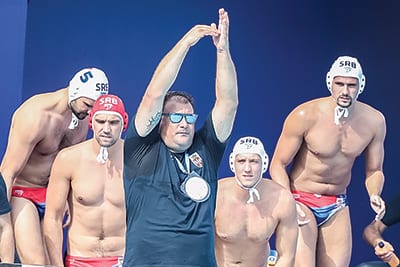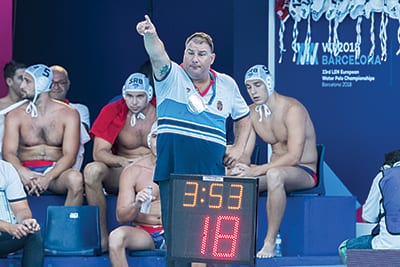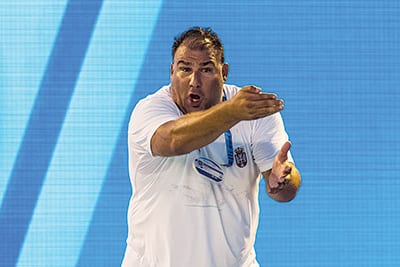I watched Dejan Savić throughout this entire playing career. From the age of 14 (1989), when Ratko Rudić gave him a chance in the Partizan first team and thus opened the door to him, as an extraordinary talent, all the way until 2010, when he retired from playing while at Red Star. He played in Spain, Italy and Russia, earning a great many friends everywhere. Alongside that, from the first to the 444th match for the national team, so many stories adorned with trophies, medals and individual awards
When he launched his coaching career in 2010, there were few – even among those who knew him well – who envisaged him achieving such results; results that few experts in any sport could boast of attaining. Already now, he could give up his coach’s blackboard, put aside his whistle and stopwatch and surrender himself to a stressfree life, aware that – along with his awards – he’s left so much behind him that there’s a question over whether anyone could repeat it. But then he wouldn’t be Deki Savić. A new cycle has begun.
A true Belgrader in every respect. Eloquent, charismatic, well-read, prepared always to ask and listen, even today, when he seemingly knows everything.
He knows everything but isn’t burning to mention that, if nothing else because he’s our man. Between 2013 and the end of 2018, Savić won 12 gold and two bronze medals with Serbia’s national team. In the first year, Serbia’s team proved to be the best at the Mediterranean Games in Tarragona, then his team won the European Championships four consecutive times, and then at the World Cup in Berlin, with players whose time has yet to come, the team won bronze.
It sounds nice to say that you won everything?
I didn’t win; they won – he says, immediately stopping every story about shared credit for members of the national squad.
Alright, you all won – players who you call dragons, the technical team and you. Amongst other things, you showed what you think about the players at the ceremony of the Olympic Committee of Serbia when you accepted the award for the Best Trainer dressed in a T-shirt featuring their picture and signed “Thank You, Guys”.
That wasn’t some advertising; that was my sincere gratitude towards them. I know what they went through, everything we did, and that without their invested effort, and our own, there wouldn’t have been any good results. This is about a collective group of top players, professionals, devoted to the job they do and, most importantly, to the national cap that they play for without discussion.
 This generation started showing it was capable of major strides in 2009, after the departure from the scene of the brilliant team to which you also belonged. The disbelief that followed them created a rarely-seen atmosphere of togetherness. It still guards itself jealously today, while you fit into it perfectly.
This generation started showing it was capable of major strides in 2009, after the departure from the scene of the brilliant team to which you also belonged. The disbelief that followed them created a rarely-seen atmosphere of togetherness. It still guards itself jealously today, while you fit into it perfectly.
Our start was at the end of 2012. We went through a period of getting to know each other, though I’d played with most of them for the national team. That introductory period was the creating of an atmosphere, primarily of trust and respect. Without it the success is not possible. That relationship is nevertheless burdened with risk, is constantly on a knife edge because too much freedom can quickly turn into anarchy.
This generation started showing it was capable of major strides in 2009, after the departure from the scene of the brilliant team to which you also belonged. The disbelief that followed them created a rarely-seen atmosphere of togetherness. It still guards itself jealously today, while you fit into it perfectly
Does that scare you?
No, why would it? It will be relaxed, according to our rules, up to the limits that we’ve set for ourselves. If that limit is crossed, then the iron hand rules.
You will agree that top results form the basis of such relationships, as something that gives them strength. Do you think about a moment when there won’t be such results; will that jealously guarded atmosphere be ruined?
It won’t; that’s all sport. We had a series of great results. That was such a series that the top news story from the 2017 world championships in Budapest was that Serbia had experienced defeat and wasn’t first. I’ve repeated that several times.
 Our goal is the Tokyo Olympics, all championships are stepping stones that serve to ensure when then play the best. The biological clock plays its part, and after Tokyo, a fair few of the players will conclude their excellent national team careers. We have replacements. But if you’re asking me about possible situations that might arise after disappointing results, then the most important thing is the organisation. How much support we have from that at that instant is the issue. We’re trying to do everything according to plan, to anticipate reactions even in that case.
Our goal is the Tokyo Olympics, all championships are stepping stones that serve to ensure when then play the best. The biological clock plays its part, and after Tokyo, a fair few of the players will conclude their excellent national team careers. We have replacements. But if you’re asking me about possible situations that might arise after disappointing results, then the most important thing is the organisation. How much support we have from that at that instant is the issue. We’re trying to do everything according to plan, to anticipate reactions even in that case.
I have a plan for that, but there must be organisational support.
We recall that you took the reigns of the national team during a chaotic period for the water polo federation. Three months after being appointed, Sovrović was replaced as president. A coordination committee monitored your first performances…
I remember that it wasn’t easy. Then we finished in seventh place at the World Championships in Barcelona. It was a big slap in the face for all of us, but a bigger slap for me than the players. It turned out that we were living in some imaginary state, a long way from reality. I then analysed the way we played, but I didn’t want to scratch too deeply beneath the surface of those relations. That wasn’t part of my job, because I knew that the deeper a scratched, the more negative would be the response from those I was leading. You know, I don’t need to know everything.
Our water polo has a culture, a tradition and responsibility. We always have high objectives. These things are inherited, transferred from generation to generation, and what’s important is that no one has the right to gamble away that inheritence
Many people would have then justified the situation within the organisation?
Perhaps, but I’ve never done that and never would.
You once said that you would probably have been replaced if the federation had had leadership. Do you still think that today; that you survived, in your opinion, due to chance?
That’s right, I survived due to chance, although I consider that everybody deserves a second chance.
Back then I was in a state of shock, seeking and expected criticism. They were absent, or could only be heard around external circles, which don’t interest me. I’ve never avoided critical positions regarding my work. They are important and can help, but who state them is also very important.
Everything after that fateful trip to Barcelona is history. From that chance as mentioned earlier happening, the lessons learnt brought unprecedented results, not only for water polo but for other sports. Does that create pressure today?
That always exists. Remember Rio. Alongside the public pressure, which is sometimes artificially created, there is our inner pressure that is even stronger. If we believe in what we’re doing, our experience from Rio tells us that there should be no fear. We need to defend our internal attitudes, our rules, and to act accordingly within the team.
Rio is an extraordinary story. It was logical for Serbia to be the top favourite. Even the Australian team’s head coach, Fatović, said that our team was the only one worthy of gold. Don’t you think that it was then that the atmosphere started to be created in which the most important mission was to remove Savić and his dragons from the throne, and that numerous national teams started working differently in pursuit of that goal?
I think that’s to be expected. Such was the moment; everyone was eager for Serbia’s scalp. And in that kind of chase mistakes are made. We are aware of everything; we try to have answers ready, to recognise their plans and react to counter them. The goal is to have answers to all questions.
Your relationship with coaches, the way you approach them and show respect, is often a topic in the media.
I’m completely honest about such things. I congratulate the opposing coach after every match and try to leave the pool quickly, to have a few minutes alone. We coaches cannot exist without one another. This century is the century of technological innovation, and it’s difficult to be able to hide anything. Here I’m referring to tactics, to elements of the game. It is essential to be better prepared in a mental and physical sense.
Yes, I’m a local patriot, and I’m currently satisfied with the life I live and am not so glutenous that I would seek more
Do you have a solution for the team after Tokyo?
I believe I do. We’re shaken by a crisis of clubs – not just in water polo. That is inevitable. We’re passing through the initial stages of a crisis and are rolling at a certain speed, perhaps a high speed.
Now we can only soften that somehow, but I’m sure that solutions exist and that we can turn things around completely to our benefit through systemic decisions. However, that’s not up to me. I think that we’re relaxed when it comes to players until 2024. That doesn’t mean we’ll have the same kind of results, but it means that this continuity in winning medals since the year 2000 should continue. The clubs that produce players are in crisis, and we must work on that, for the quality that we’ll need for the period after 2024 to emerge.
When are you selecting players, what do you insist on – apart from obvious talent?
 Alongside water polo skills, there must be an element that is reflected, on the one hand, in exceptional individuality and, on the other, in the ability to fit into the team. The team is above everything, above personal ego. Such a player must adapt to the conditions that form the tradition and atmosphere of the team. In the end, all that remains is the acceptance of individuals on the part of the team. Of course, I don’t need to mention that mental structure is the dominant factor of the whole story. I said in one interview that we have to be very careful in that respect. Our water polo has a culture, a tradition and responsibility. We always have high objectives. These things are inherited, transferred from generation to generation, and what’s important is that no one has the right to gamble away that inheritance.
Alongside water polo skills, there must be an element that is reflected, on the one hand, in exceptional individuality and, on the other, in the ability to fit into the team. The team is above everything, above personal ego. Such a player must adapt to the conditions that form the tradition and atmosphere of the team. In the end, all that remains is the acceptance of individuals on the part of the team. Of course, I don’t need to mention that mental structure is the dominant factor of the whole story. I said in one interview that we have to be very careful in that respect. Our water polo has a culture, a tradition and responsibility. We always have high objectives. These things are inherited, transferred from generation to generation, and what’s important is that no one has the right to gamble away that inheritance.
It is well known that you’re burdened and engaged in your work by things that are not part of your job description. How do you endure that?
You’re right. I’m doing something that’s not my niche, which occupies a lot of my time. That annoys me. The moment is critical, and there’s never enough time; time for that which is needed by a coach in any sport.
You initiated the formation of the Association of Water Polo Coaches. Recently, along with Dragan Jović and Zoran Gajić, you participated in a panel of experts. Is an association of top experts at the national level one of the solutions to achieving a better status for Serbian sport?
I’m not sure that something like that doesn’t already exist. I think we need to be more visible, that we’re not sidelined in relations towards players. If we want seriousness and professionalism, we need to be protected in our domain. In this way, we would be able to devote ourselves solely to our work and to do that job without thinking about external things.
After that panel, you declared your support for women in sports. Do you see yourself as a possible coach of ladies teams?
Uh… I don’t think I’m strong enough mentally for such an adventure. But with a year or two preparing myself, why not?
It is known that you like the company, taverns, socialising. You like to sit in one of them that’s in the building where you live. You single out your “Oscar-winner” friends as an essential part of your everyday life.
Those are people with great and rich life careers. I’m capable of sitting, listening and learning. Due to my obligations, it is rare for us to see each, but we’ll make up for what’s missed.
After all these results that are hardly reproducible, you’ve stayed in Serbia despite numerous invitations. Do your “Oscar winners” ask you why you haven’t left?
They ask every time.
Alongside the public pressure, which is sometimes artificially created, there is our inner pressure that is even stronger. If we believe in what we’re doing, our experience from Rio tells us that there should be no fear. We just need to defend our internal attitudes, our rules, and to act accordingly within the team
What do you tell them; what would you lose?
I tell them that I’d lose them, comrades, friends, Belgrade. I’m nostalgic, everything connects me to the neighbourhood, previously to Miljakovac, where my parents live, and now Dorćol, where I live with my family that supports me in everything I do.
Yes, I’m a local patriot, and I’m currently satisfied with the life I live and am not so glutenous that I would seek more.
There’s a day at the end of the year when your generation gathers together in a tavern. And there you’re also one of the initiators of the gathering.
That’s in the spirit of some tradition of ours. You know, there I use that curse from the dinner with Prince Lazar “Who doesn’t come tomorrow…”. It’s always nice. No matter how much we try to talk about everyday things, how much more we joke around, we always touch on water polo. That’s a big and important part of our lives, and their support means a lot.
That’s a generation of great names that were only deprived of Olympic gold.
I answered that question earlier with Danilo Ikodinović’s statement that we probably didn’t deserve that gold for some reason.
I watched you play from the beginning of your career to the end. I believe that you gave your enormous individual quality in the function of the team and consciously created space for others to express their abilities. Would you do that again today?
I prepared for this question, and I don’t have an answer. Better to say it like this: I only did what was sought from me; I was a soldier carrying out orders. And as for my career, I wouldn’t change anything.
To conclude, how do you spend your free time?
With family, relaxing, driving through Belgrade’s empty streets on Sunday mornings. Films, books. I’m interested in the Great War.
What do you recommend?
The Iron Regiment by Darko Nikolić. This is not an advertisement; it’s a great book. And that’s where the story ends, at least for this time. I’ve written countless interviews with Dejan Savić. From a kid starting to build his career as a player and a personality to today – when he’s a mature and successful man in every respect. In his character he’s remained the same, with feet firmly on the ground, aware of everything encompassed by a coach’s life. That’s undoubtedly why he’s one of the most valued characters of Serbian sport.
| RELATIONSHIP
That relationship is nevertheless burdened with risk, is constantly on a knife edge, because too much freedom can quickly turn into anarchy |
LEADERSHIP
I knew that the deeper a scratched, the more negative would be the response from those I was leading. You know, I don’t need to know everything |
ROLE
I only did what was sought from me; I was a soldier carrying out orders. And as for my career, I wouldn’t change anything |
|---|